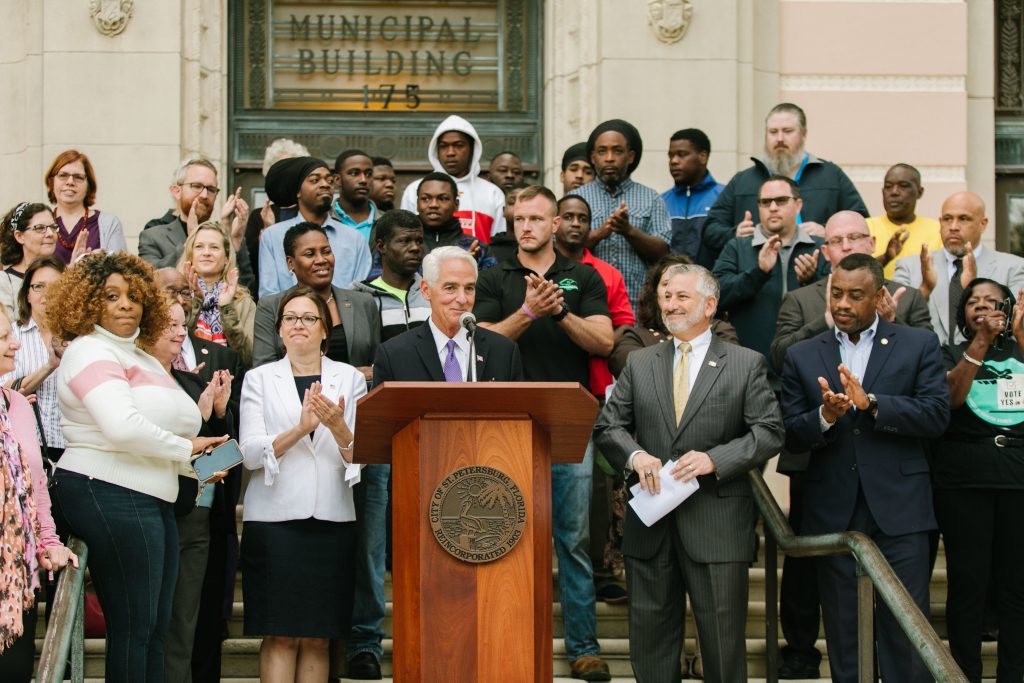
In 2018, Florida voters approved Amendment 4 by an overwhelming majority. Amendment 4 restored voting rights to more than a million Floridians who had been disenfranchised due to their status as convicted felons. The amendment, which excluded those convicted of murder or sexual assault, applied to convicted felons who had completed “all terms of sentence including parole or probation.”
In July of this year, the Republicans who dominate the state legislature moved to water down Amendment 4. The legislature and Republican Governor Ron DeSantis passed a law restricting re-enfranchisement to those convicted felons who had paid off all fines, fees and restitution. It was a transparently self-interested attempt to sow chaos and confusion into the process, making it more difficult for a disproportionately African-American group of potential voters from accessing the ballot.
That law was immediately challenged in federal court by activists who said it constituted a modern-day poll tax. And last week a federal judge issued a ruling that, while limited, indicated that the state of Florida cannot deny restoration of voting rights based on an individual’s inability to pay fines or restitution.
How the Judge Ruled
Before diving too deeply into the ruling, issued by US District Court Judge Robert Hinkle, it’s important to understand what the ruling did not do. Hinkle did not strike down the July law, and he did not hold that all affected felons are immediately eligible to vote. In fact, Hinkle’s ruling was explicitly limited to the 17 plaintiffs who had challenged the law.
In his ruling, Hinkle turned down a request by the ACLU and other voting rights groups to block the July law entirely. Hinkle acknowledged that there were several difficult constitutional questions raised by the legislature’s reaction to Amendment 4, but said those questions would have to be answered by other federal courts and the Florida Supreme Court.
However, Hinkle – citing federal precedent – said that the state could not condition an individual’s voting rights on their ability to pay fines or fees. And he ruled that restitution was no different. As such, Hinkle ruled, the state must allow re-enfranchisement applicants rejected due to outstanding fines or fees to prove that they are financially incapable of paying.
As noted above, the judge’s ruling is limited to the 17 plaintiffs involved in the case. However, it’s expected that Hinkle will expand his ruling to cover all Floridians in the coming months after additional hearings.
An Onerous Burden
But while voting rights groups rightfully celebrated the judge’s ruling, other analysts cautioned that its impact might prove limited.
In his ruling, Judge Hinkle made clear that individuals who had been denied re-enfranchisement due to outstanding financial obligations did not automatically have their voting rights restored. Instead, Hinkle laid out an arduous process by which Floridians must prove their lack of financial resources and set the burden firmly on the shoulders of the applicants.
Under the process laid out by Hinkle, a Floridian applying for re-enfranchisement would have his or her information sent to the Florida Secretary of State, where that information would be screened for a disqualifying factor (such as outstanding fines or fees). If disqualified, the individual would have the ability to contest the disqualification and establish that he or she was unable to pay the outstanding obligation.
This is a lengthy, difficult process, and the burden of proof is on the applicant. An individual seeking re-enfranchisement would have the choice of trying to navigate the system themselves or hiring an attorney to help them. And a convicted felon who can’t pay fines or fees almost certainly can’t afford a lawyer.
In addition, Hinkle said that the state could choose the method by which applicants had to prove their inability to pay. This places a significant amount of power in the hands of state legislators who have already shown that they are intent on making this process as difficult as possible for Floridians.
Hinkle was working within certain legal constraints. Florida legislators had claimed that the text of Amendment 4 was unclear, and while advocates for the amendment disagreed, the state Supreme Court will ultimately rule on whether or not the original amendment’s “all terms of sentence” language includes fines and fees. Hinkle made clear in his ruling that he expects the Supreme Court to interpret the amendment in the most restrictive fashion possible – the court is staffed exclusively by justices appointed by Republican governors (Democrats haven’t held the governor’s mansion since 1999).
American Legal News has been writing about the importance of Amendment 4 since 2018. If fully implemented, the amendment has the potential to completely upend Florida politics. However, Florida Republicans are working hard to prevent full implementation. It remains to be seen if the judicial branch will provide them with any meaningful resistance.



Leave a Comment